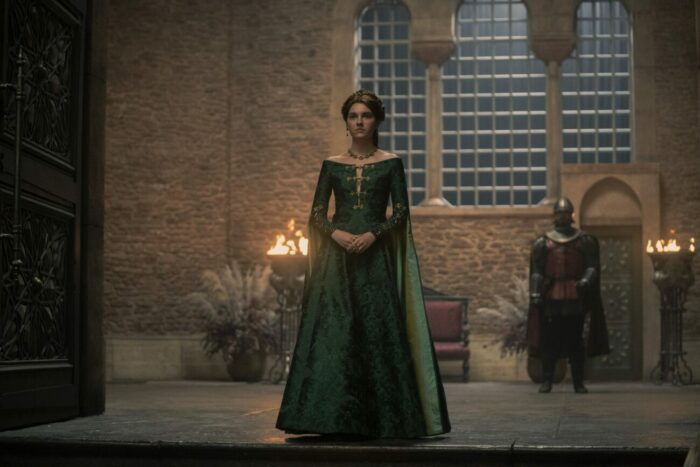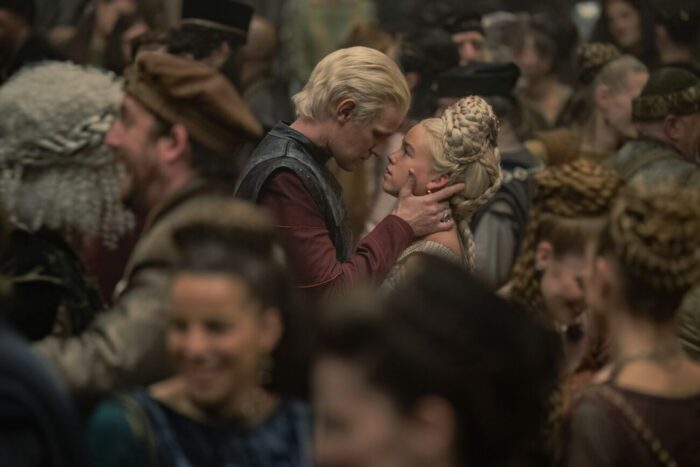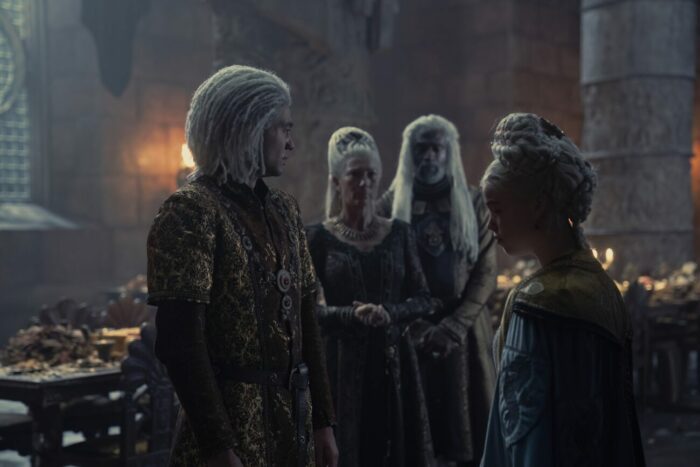The following contains spoilers for House of the Dragon S1E5, “We Light the Way” (written by Charmaine De Grate and directed by Clare Kilner)
In the original run of Game of Thrones, Episode 9 was typically “the big one,” the one where major events of the season would happen and ensure that we got a cool down of sorts with the season finale to process what we had just seen—think The Red Wedding, the death of Ned Stark, the Battle of the Bastards, and the battle on the Blackwater. Given that it’s the last episode before the big time skip that effectively kicks off the second half of the season, it’s fitting that House of the Dragon Episode 5 ultimately winds up feeling like an Episode 9 of sorts. It’s the event episode, the one where the arc of the show changes in a tangible way, and like most Episode 9s in the original Thrones run, is one of the best episodes of the season—but it’s also one held back from greatness by the show’s biggest weakness continuing to show up in key moments.
One of the weakest points of House of the Dragon has consistently been in its organic storytelling—or more accurately, lack thereof. Whether it’s characters all but looking at the camera and telling us exactly how many years have passed since the previous episode or someone monologuing for a good 30 seconds on the symbolic importance of something before it ultimately appears, the show seems insistent on telling their audience absolutely everything at the cost of killing any sense of wonder or intrigue. There’s hardly a moment where the show feels like it’s challenging you to try and put the pieces together yourself.
A big part of what made the original Thrones so gripping from the beginning was the sense that everyone—good or bad—had some important piece of information that they weren’t telling us, whether it was the secret Ned Stark took to his grave about Jon’s true parentage or Petyr Baelish’s hidden agenda that led him to ultimately betray Ned (and just about everyone he could, to try and claw his way up the halls of power one way or another). House of the Dragon, by comparison, almost feels like it’s afraid of alienating the audience and repeatedly insists on laying all its cards out on the table. The end result is many, many cases where dialogue is so blatantly just exposition dumping that it barely even counts as dialogue, and it repeatedly kills whatever sense of intrigue or momentum that might be built up.

Take, for instance, the conversation between Corlys and his wife after agreeing to Viserys’ marriage proposal. It’s certainly one that the two of them would have: they’re fully aware of the tense subject of succession and are worried about how their son and his heirs will play into that. But the conversation itself feels completely stiff and unnatural, less like two people expressing their concerns to one another and more like someone in a writer’s room using two characters to make absolutely certain that you know what’s going to come next.
This problem even rears its ugly head in House of the Dragon‘s eventful moments. Alicent’s late entrance to the opening feast of Rhaenyra and Laenor’s wedding is one such show-stopping moment, showing up right in time to interrupt Viserys’ big speech. But even beyond the surface level “holy crap she’s interrupting the king during his speech to open the celebration for his heir’s wedding,” something deeper seems to have people in an uproar. It’s intriguing! I feel like they know something I don’t and it makes me interested! I want to know more about what’s going on! Unfortunately, that intrigue only manages to last for about 30 seconds before we cut to two side characters spelling it out for us: green, the color of the dress she chose to wear, is the color traditionally flown at Hightower when they call their bannermen for war, all but telling us that this is meant to be Alicent’s declaration of war—or at least, that she is refusing to go down without a fight.
Every instance of this is not only god-awful screenwriting, but it also completely shuts down any real sense of engagement I might have with the world and its themes. After all, why should I be curious or think critically about what’s happening when the showrunners are likely just going to spell things out for me in black and white? It’s also a sign of a remarkable lack of confidence on behalf of the creative team, not only in themselves to organically convey a message or meaning to their audience, but also in said audience to pick up on said themes without being spoonfed.

So why, then, do I consider this to be one of the best episodes of the series so far after spending a fair amount of time kvetching about its shortcomings? Well, as I’d like to think has been well established by now, House of the Dragon is very much a show more in line with the overblown drama you might find in a soap opera or trashy reality show, and Episode 5 delivers overblown drama in spades. It’s still a lot of setup for the real events—which are likely coming after the big time skip—but it’s entertaining as all hell and the bodies are starting to drop.
Daemon spends most of the episode being quiet and creepy, but he does manage to find time to kill his wife in order to add the Vale and its army to his own forces and potentially source her replacement in Laena Velaryon. Otto Hightower makes his unceremonious exit from King’s Landing but manages to further poison Alicent’s mind one last time before leaving. Rhaenyra and Laenor speedrun from engagement to marriage seemingly overnight, with an understanding between the two that their marriage is one of political convenience and that they should both feel free to pursue their own tastes.
Laenor’s tastes happen to be for men rather than women, throwing yet another potential wrinkle in the already messy succession thing. And yes, the show did have a short conversation between Laenor’s parents talking about him “growing out of it” and how “there’s no greater pleasure than bedding a woman,” because apparently the following scene of Laenor having a somber yet tender moment with another man before kissing that other man wasn’t quite enough to explain the fact that he’s gay (if you haven’t picked up on it yet, I get just a little touchy when I feel like a show is treating me like a moron!)

Meanwhile, we get the almost complete fall from grace of one Ser Criston Cole. Turns out, not only have his repeated evening encounters with Rhaenyra led to him catching feelings, but he’s also that almost certainly fatal combination of earnest, chivalrous, and dumb: he wants to marry Rhaenyra himself and thinks that his proposal of the two of them sailing off into the unknown sunset is a more intriguing offer than ruling over the Seven Kingdoms. He storms off when Rhaenyra turns him down, thinking that marrying her would restore his honor after breaking his vow of chastity, only to immediately be summoned by Alicent. She questions him about Rhaenyra’s night with Daemon—but he thinks she’s talking about him and confesses to the affair with Rhaenyra. Given everything that’s happened, and everything he’s feeling guilty about, it’s only so long before Criston reaches his breaking point, and his response to seeing Rhaenyra enjoying herself at the celebration while he’s stuck on guard duty and Laenor’s lover introducing himself and proposing that the two of them keep each other’s secrets is to have a complete breakdown and wind up beating said lover to death, which puts somewhat of a damper on the festivities.
So, it’s on a recently bloodied floor that Rhaenyra and Laenor ultimately say their vows, while Criston—ever the stupid, honorable man—decides to do the stupid, honorable thing and attempts to end his own life, only to be stopped by Alicent. As if things weren’t awkward enough already, Viserys—who by now is visibly rotting away—decides that right at the end of his daughter’s vows is the right moment to drop…perhaps not necessarily dead but certainly not in any sort of healthy condition.
That makes two impactful deaths, what’s likely the beginning of the death that’s going to change the game completely, and both the proverbial sword of the succession question and the big time skip are bearing down on the narrative and everyone involved with alarming speed. House of the Dragon might not be able to get away from its own worst habits, but the show is nonetheless only getting more and more entertaining with each passing week, and with King’s Landing feeling like it’s nearly at the breaking point I can’t wait to see how things play out before the big time jump coming after next week.

